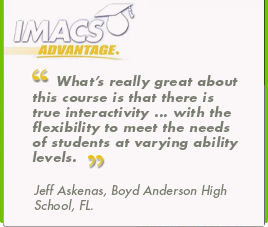Logic: The Propositional Calculus
By Stanley Chang,
Professor of Mathematics, Wellesley College, MA
In many college mathematics curricula students are challenged to
bridge the mental gap between heavily computational courses such as
multivariable calculus and proof-based courses such as linear algebra and real
analysis. While a number of institutions offer semester-long classes on
set theory and logic, most mathematics departments consign the pedagogy of
such topics to a few lectures in their intermediate curricular offerings,
where they receive only perfunctory and incomplete treatment at best.
This minicourse remedies this lacuna in the university mathematics
curriculum by offering to students a concise yet thorough description
of mathematical reasoning and logic. With exercises, self-correcting
problem sets and a host of examples, the syllabus provides an ideal
platform for self-guided study that students can tackle at any point
during the academic year.
The Formal Language
Introduction
Mathematical Sentences
Well-formed Formulas 1 2 3
Interpreting Well-formed Formulas
Decomposing Well-formed Formulas
Introduction to Truth Tables
The Truth Table for Conjunction
Building Truth Tables: Negation and Conjunction
The Truth Tables for Disjunction and Implication
Problem Set LM1.1
Tautologies and Contradictions
Equivalent Well-formed Formulas
Problem Set LM1.2
Converse and Contrapositive
Equivalence and Tautologies
Negating formulas
Wffs, Meta-wffs, and Instances
Truth Table Templates
The Tautology Principle
Problem Set LM1.3
Introducing Demonstrations
Modus Ponens
Applying Modus Ponens
Demonstrations and Program Outlines 1 2
What is a Demonstration?
Problem Set LM1.4
Conjunctive Inference
Conjunctive Simplification
Problem Set LM1.5
Unnecessary Hypotheses
Contrapositive Inference and Modus Tollens
Applying Modus Tollens
Problem Set LM1.6
Syllogistic Inference
Inference by Cases
Problem Set LM1.7
Modus Ponens for the Biconditional
Contrapositive Inference and Modus Tollens for the Biconditional
The Substitution Principle 1 2
Problem Set LM1.8
Tautologies and Demonstrations 1 2
The Substitution Principle and Equivalence
Consequences of the Substitution Principle
Rules of Inference: A Summary
Problem Set LM1.9
The estimated completion time is 20 hours.
With a clear understanding of deduction and rules of inference,
students in intermediate-level mathematics courses are better prepared
to follow and to create arguments based on these logical principles.






